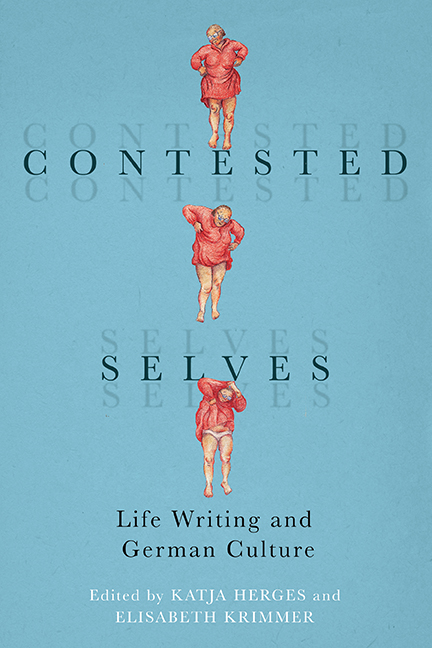Book contents
- Frontmatter
- Contents
- Acknowledgments
- Introduction
- Part I Women’s Life Writing, Female Subjectivity and Agency
- Part II Modern Life Writing and Aesthetics
- Part III Trauma and Vergangenheitsbewältigung
- Part IV Transnational and Transgenerational Life Writing in Contemporary Germany
- Bibliography
- Notes on the Contributors
- Index
2 - A Force of Nature: Narrative Strategies of Autobiography in the Work of Poet-Queen Carmen Sylva
Published online by Cambridge University Press: 26 May 2022
- Frontmatter
- Contents
- Acknowledgments
- Introduction
- Part I Women’s Life Writing, Female Subjectivity and Agency
- Part II Modern Life Writing and Aesthetics
- Part III Trauma and Vergangenheitsbewältigung
- Part IV Transnational and Transgenerational Life Writing in Contemporary Germany
- Bibliography
- Notes on the Contributors
- Index
Summary
IN A LETTER TO HER HUSBAND, King Carol I, in 1891, Queen Elisabeth of Romania (1843–1916) describes herself as “nicht zu fassen.” The indistinct meaning of this phrase, ranging from “incredible” and “unbelievable” to “hard to grasp,” speaks to the many diverse ways to interpret the complex life of a queen who during her lifetime was known throughout Europe under the pen name Carmen Sylva. As an author, she produced over fifty volumes of writings, including collections of poems, fairy tales, and short stories, as well as individual and coauthored novels, translations, essays, memoirs, letters, and musical compositions. The queen's rather tongue-in-cheek phrase is relevant to a discussion of autobiography, voice, creativity, and gender, as it refers to a court scandal for which she was held directly accountable, if in her view unfairly. Known as the Văcărescu Affair, the incident involved Sylva's attempt to attain approval for the marriage of her literary collaborator and favorite lady-in-waiting, Elena (Hélène) Văcărescu, to the crown prince Ferdinand (Nando) Hohenzollern-Sigmaringen—the first and only time she ever attempted to use her voice in official political discourse. It resulted in the silencing and removal of the queen from the public sphere: she was banished from Romania for two years (1892–94). While her intrusion into court politics and the censorship that ensued reflect the queen's effort to claim her voice and have it heard publicly, Sylva's authorial endeavors illustrate a similar struggle. In the following I consider two literary examples, the memoir Mein Penatenwinkel (1907; in English as From Memory's Shrine, 1911) and the fairy tale “Der Pelesch” (The Peleş, 1883), that highlight her thematic and narrative play with issues of voice and voicelessness, reflective of what Sidonie Smith calls a “doubled subjectivity” in which the author functions as both protagonist and narrator. These two examples of Sylva's work—the fairy tales produced in the early years of her publication history and the memoir that came toward the end of her life—reflect a small segment in the span of Sylva's autobiographical repertoire.
You may wonder how a German princess, born Elisabeth Pauline Ottilie Luise, princess of Wied, to Princess Marie of Nassau and of Wied and Prince Hermann of Wied, became the queen of Romania and a writer.
- Type
- Chapter
- Information
- Contested SelvesLife Writing and German Culture, pp. 51 - 72Publisher: Boydell & BrewerPrint publication year: 2021



